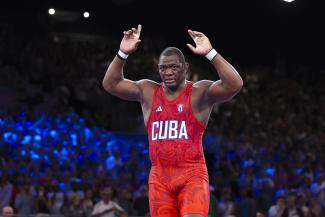Five Must-Watch Matches From the #WorldCupIowaCity
Wednesday, April 11, 2018 - 02:21 By

1.Tariel GAPHRINDASHVILI (GEO) df. Iderkhuu GANTULGA (MGL), 22-17.
This 39-point match took place during the fifth and sixth place dual between Georgia and Mongolia. After six lead changes, Gaphrindashvili erased a 16-10 deficit and ended the match on a 12-1 run.
2. Taiki YAMAMOTO (JPN) df. Yudenny ALPAJON ESTEVEZ (CUB), 6-5.
This was arguably the most important match of the entire tournament. After Cuba stormed back to win four of the last six bouts, Japan’s hopes of winning a bronze for the first time since 1985 were placed on the back of their final wrestler, Taiki Yamamoto (JPN).
Yamamoto trailed 5-4 heading into the final 30 seconds of the match. He got to a high crotch on the right side and ended up taking the lead on criteria after driving Alpajon Este out of bounds to pick up the step out point. After Cuba’s failed challenge and a late flurry from Alpajon Este, Yamamoto hung on to win the match, 6-5.
3. Dato MARSAGISHVILI (GEO) df. J'Den Michael COX (USA), 5-0.
This was a battle of London Olympic bronze medalist v. Rio Olympic bronze medalist. Marsagishvili's shutout of Cox gave Georgia one of only two wins during the entire USA dual.
Marsagishvili, Georgia's only undefeated wrestler on the weekend also defeated world No. 1 Turtogtokh LUVSANDORJ (MGL) and finished the World Cup without surrendering an offensive point while outscoring his opponents 30-0.
4. Logan Jeffery STIEBER (USA) df. Haji ALIYEV (AZE), 6-2.
A battle of former 61kg worlds champions who recently made the move up to 65kg. Logan Stieber the 2016 61kg world champion took on Haji Aliyev, the three-time world champion, and Olympic bronze medalist.
After this weekend, Aliyev admitted to the struggles that he's faced at 65kg, saying “I changed weight categories and moved up to 65kg. It’s different, it’s difficult. I need to focus, but I think I’ll be fine…I changed to 65kg three months ago and just need to train more."
5. Daichi TAKATANI (JPN) df. Alejandro Enrique VALDES TOBIER (CUB), 10-8.
It took Takatani all he had to stop a gut wrench that would have given Valdes Tobier's the 10-0 technical superiority victory in period number one.
When asked about falling behind 8-0, Takatani said: "I knew I was down 8-0, but I also knew that it was time for my Japanese pride to kick it." That Japanese pride kicked in to the tune of a Takatani 10-8 run to end the match and gave Japan the 3-0 lead heading into the fourth bout of the dual.


Share your thoughts.
Comments